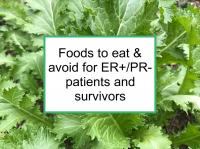Up to 15 percent of invasive breast cancers are classified as estrogen receptor positive and progesterone receptor negative (ER+/PR-/HER2+ or ER+/PR-/HER2-). In other words, the relevant genes cause the cancer cells to express estrogen receptors, but not progesterone receptors. Such cancers can be HER2-positive or not.
Compounds that regulate ER or PR expression, oppose the production of estrogen in the body (i.e., oppose aromatase) or inhibit estrogen binding to estrogen receptors are among those used to treat this type of breast cancer. Tumors with a large number of estrogen receptors are associated with a better the prognosis than those with few. However, ER+/PR- breast cancer patients may be more likely than ER+/PR+ patients to benefit from epidermal growth factor receptor (EGFR) inhibitors and possibly from foods that inhibit the EGFR receptor.
Foods that may reduce the risk of ER+/PR- breast cancer
There are only a few studies that specifically have examined associations between various foods or micronutrients and ER+/PR- breast cancer risk. Based on the limited available evidence, foods that are good dietary sources of apigenin, folate, or enterolactone, or that have components shown to inhibit EGFR (epidermal growth factor receptor) activity have the potential to reduce ER+/PR- breast cancer risk or its recurrence:
Please read the applicable food webpages when making your own food lists since these pages contain important advice, food rankings (e.g., highly recommended, recommended in moderation), consumption limits, and other pertinent information.
Foods that increase the risk of ER+/PR- disease
Significant associations have been found between carbohydrate intake, glycemic load and higher risk of ER+/PR- breast cancer. This suggests that women with ER+/PR- breast cancer should avoid foods such as white bread, cakes and sugar, as well as refraining from eating meals with a high overall glycemic load. Alcohol and pan-fried red meat have also been found to be associated with higher risk of ER+/PR- breast cancer. The following foods have the potential to increase the risk of ER+/PR- breast cancer:
- Alcohol, all types
- Bread, white
- Cookies, candy and cake
- Cornflakes and similar breakfast cereals
- Granola
- Plantains, fried ripe
- Potatoes, white
- Red meat, especially fried
- Rice, white
- Sugar
- Sweet desserts
Supplements for ER+/PR- patients and survivors
There is no supplement or combination of supplements that has been proven to reliably reduce the risk of ER+/PR- breast cancer recurrence in women. Attempting to take advantage of the apparent treatment effects of micronutrients and other dietary components by using supplements carries the risk of adverse and paradoxical effects, including promoting breast cancer growth and metastasis.
What is known is that when a beneficial micronutrient is administered at low doses by consuming food, it is likely to have subtle chemopreventive effects, whereas when the same micronutrient is administered at high doses, it is more likely to have pharmacological effects, with mostly unknown results. It is best to obtain beneficial compounds by consuming food, if possible. Supplements make sense if medically necessary or to make up for deficiencies that are difficult to correct through diet.
The following supplements generally have been found to be safe and beneficial for ER+/PR- patients and survivors:
Please consult your oncology team for advice concerning your situation and dosages. It might make sense to be tested for vitamin D deficiency and plan for follow-up testing to determine if your reading has reached a desirable level.
Supplements and other that increase ER+/PR- risk
The following have the potential to increase the risk of ER+/PR- breast cancer, mostly through their estrogenic effects:
- Apigenin supplements
- Astragalus or huang qi supplements
- Genistein, daidzein or equol supplements
- HRT, combined (estrogen plus progestin), including bioidentical hormones
- Licorice root supplements
- Milk thistle supplements
- Honey, propolis or royal jelly supplements
- Quercetin supplements
- Red clover supplements
- Reishi mushroom supplements (ok for IBC)
- Sage supplements & sage essential oil
Additional comments
ER+/PR- breast cancer patients and survivors would benefit from eating a wide variety of the foods on our recommended food list and limit or avoid those on our avoid list, in addition to paying particular attention to the foods on the lists above.
Below are links to 20 recent studies concerning ER+/PR- disease and diet. For a more complete list of studies, please click on mixed ER PR.
